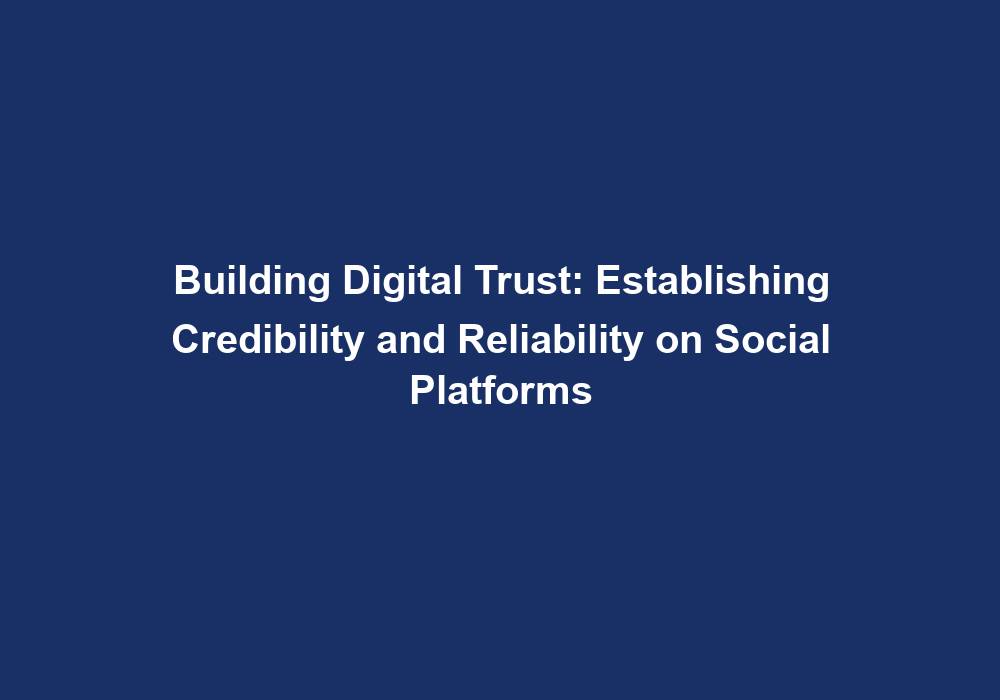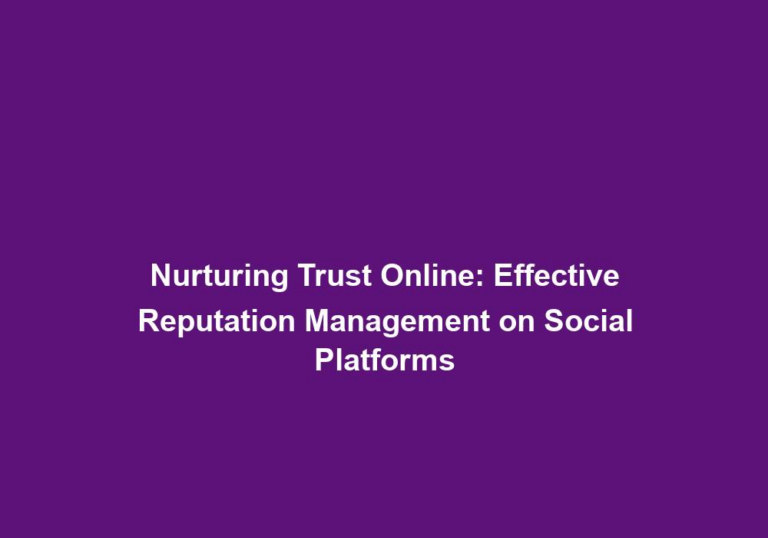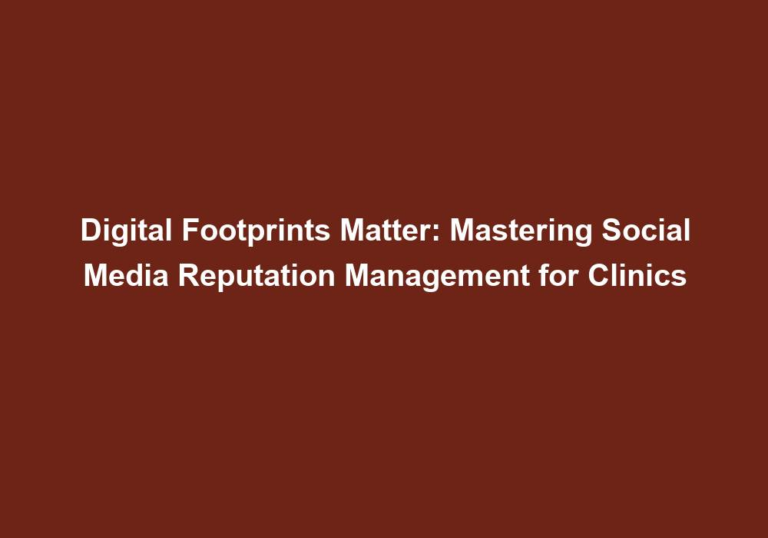Building Digital Trust: Establishing Credibility and Reliability on Social Platforms
In today’s digital age, establishing trust and credibility on social platforms is essential for businesses and individuals alike. With the increasing reliance on digital interactions, consumers often rely on social media platforms to make purchasing decisions, seek recommendations, and gauge the reputation of brands and individuals.
To successfully build digital trust, it is crucial to understand the factors that contribute to credibility and reliability on social platforms. This article will explore effective strategies and best practices to help businesses and individuals establish a strong online presence, foster trust, and enhance their reputation.
Why Is Digital Trust Important?
Digital trust plays a pivotal role in shaping consumer behavior and decision-making. When consumers trust a brand or individual online, they are more likely to engage, follow, and recommend them to others. Trust forms the foundation of successful relationships, which are vital for businesses to thrive in the digital landscape.
Without digital trust, potential customers may be hesitant to engage, make purchases, or share personal information. Therefore, cultivating a trustworthy and credible online presence is vital for businesses and individuals seeking to maximize their influence and reach on social platforms.
Building Digital Trust: Best Practices
1. Consistent Branding
Consistency in branding is key to establishing credibility on social media. This includes using consistent colors, fonts, and visual elements across all social media profiles and platforms. A cohesive and visually appealing presence builds recognition and trust among your audience.
- Use the same logo and brand colors across all social media platforms.
- Maintain consistent messaging and tone of voice that aligns with your brand identity.
- Create a style guide to ensure consistency in visual elements such as fonts, graphics, and images.
2. Engaging Content
Creating high-quality and engaging content is essential to captivate your audience and establish your expertise. Share valuable insights, educational articles, industry news, and captivating visuals that align with your brand’s values and target audience. Engaging content encourages interactions, boosts your credibility, and positions you as a reliable source of information.
- Conduct thorough research to provide accurate and up-to-date information.
- Use storytelling techniques to make your content relatable and memorable.
- Incorporate multimedia elements such as videos, infographics, and interactive content to increase engagement.
3. Respond to Feedback
Active engagement with your followers is crucial for building trust and credibility. Respond promptly and courteously to both positive and negative feedback. Demonstrate your commitment to customer satisfaction and show that you value their opinions. By addressing concerns and resolving issues, you can win over dissatisfied customers and showcase your reliability.
- Monitor your social media channels regularly for comments and messages.
- Respond to feedback in a timely manner, acknowledging the feedback and providing solutions if necessary.
- Use personalized responses to show genuine care and concern for your audience.
4. Showcase Testimonials and Reviews
Displaying positive testimonials and reviews on your social media platforms can significantly enhance your credibility. Encourage satisfied customers to share their experiences and opinions about your products or services. These testimonials act as powerful social proof, reinforcing your reliability and encouraging others to trust your brand.
- Reach out to satisfied customers and ask for their permission to feature their testimonials.
- Create visually appealing graphics or videos to showcase the testimonials.
- Include specific details and anecdotes to make the testimonials more compelling and relatable.
5. Collaborate with Influencers
Partnering with influential individuals in your industry can help establish credibility and extend your reach. Identify relevant influencers who align with your brand values and have a substantial following. Collaborating with them through sponsored posts or partnerships can boost your credibility and expand your audience.
- Research and identify influencers who have a genuine connection with your target audience.
- Develop mutually beneficial partnerships that align with your brand’s values and objectives.
- Measure the success of influencer collaborations through key performance indicators such as reach, engagement, and conversions.
6. Utilize Social Media Analytics
Regularly monitor and analyze your social media metrics to gain insights into your audience’s preferences and behavior. Identify which types of content generate the most engagement and adjust your strategy accordingly. By using data-driven decision-making, you can continuously refine your approach and build trust with your target audience.
- Use social media analytics tools to track key metrics such as reach, engagement, and click-through rates.
- Identify patterns and trends in audience behavior to tailor your content and messaging.
- Experiment with different content formats and posting schedules based on data insights.
7. Transparency and Authenticity
Being transparent and authentic is crucial for building trust in the digital world. Share behind-the-scenes content, employee stories, and testimonials to provide an authentic glimpse into your brand’s personality. Transparency fosters a sense of honesty and reliability, strengthening the bond between your brand and your audience.
- Share stories and experiences that highlight your brand’s values and mission.
- Use live videos or behind-the-scenes footage to showcase the human side of your business.
- Admit mistakes and take responsibility when necessary, demonstrating integrity and a commitment to improvement.
8. Protect User Data
Privacy and security are paramount in building digital trust. Clearly communicate your data protection policies and ensure that all user information is safeguarded. Implement secure payment gateways, SSL certificates, and other protective measures to instill confidence in your customers and safeguard their sensitive information.
- Clearly outline your data protection policies in a dedicated privacy policy page.
- Use secure encryption protocols to protect user data during transactions.
- Regularly update your security measures to stay ahead of emerging threats and vulnerabilities.
9. Support Social Causes
Demonstrate your commitment to social causes and corporate social responsibility (CSR) initiatives. Engage in ethical practices, promote sustainability, and support charities aligned with your brand values. By actively contributing to the betterment of society, you establish your brand as a reliable and trustworthy entity.
- Identify social causes that resonate with your brand and target audience.
- Participate in relevant events, fundraisers, or volunteer activities.
- Share updates on your social media platforms to raise awareness and showcase your involvement.
10. Continuous Improvement
Building digital trust is an ongoing process. Continuously evaluate your strategies, analyze feedback, and adapt to evolving trends. Stay updated with the latest social media algorithms and best practices to ensure your approach remains relevant and effective. By consistently improving and adapting, you can maintain credibility, reliability, and trust on social platforms.
- Regularly assess the effectiveness of your social media strategies using key performance indicators.
- Stay informed about industry trends and emerging platforms to diversify your online presence.
- Seek feedback from your audience and make adjustments based on their preferences and needs.
Conclusion
In the digital realm, building trust and credibility on social platforms is crucial for businesses and individuals to succeed. By implementing the strategies and best practices outlined in this article, you can establish a strong online presence, foster trust, and enhance your reputation. Remember, consistency, engaging content, responsiveness, transparency, and continuous improvement are key elements in building digital trust. Start implementing these practices today to unlock the potential of social platforms and build lasting relationships with your target audience.







